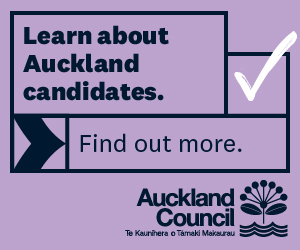
Auckland Council

Freshwater
The worsening state of New Zealand’s lakes and rivers is a major challenge for regional councils, which play a leading role in managing freshwater in their areas. To this end, regional councils create plans to protect water resources from contaminants and overuse.

Freshwater
The worsening state of New Zealand’s lakes and rivers is a major challenge for regional councils, which play a leading role in managing freshwater in their areas. To this end, regional councils create plans to protect water resources from contaminants and overuse.
Base water quality readings on actual physical water readings, not unquantified results taken at council office water coolers.
Ensure water tables are healthy and not being commercialised for offshore interests over local needs, local not centralised control of asset.
Consult with farmers and growers and the rural community on rural water issues and needs.
Ensure Auckland Council Swim-Safe recommendations are based on physical water quality readings, not modelled water quality predictions.
Commit council to regular physical water quality monitoring of all urban waterways.
Ensure management of water tables so irrigation of Pukekohe elite growing soils is maintained.
Continue to fund Swimsafe water quality monitoring programme.
Work with residents to ensure compliant septic tank and wastewater systems are working well and not leaching into local waterways.
Support local community funding for waterway clean up projects from Water Quality Targeted rate.
Commit to working with central government on any new fresh water legislation.
Commit to working with local businesses on land affecting water resources.
Commit to working with the rural community on improving irrigation.
No to Three Waters, further discussion required with new mayor, councillors and local board.
No to central government control of Auckland assets.
Clear debris from streams/rivers/awa by 2023 winter.
Fund community groups to plant riparian margins and water quality initiatives like inanga spawning sites.
Work with the new National Policy Statement on Freshwater Management to raise the water quality of our rivers and streams.
Protect our existing wetlands to promote biodiversity against the threat of encroachments and climate change.
Base water quality readings on actual physical water readings, not unquantified results taken at council office water coolers.
Ensure water tables are healthy and not being commercialised for offshore interests over local needs, local not centralised control of asset.
Consult with farmers and growers and the rural community on rural water issues and needs.
Ensure Auckland Council Swim-Safe recommendations are based on physical water quality readings, not modelled water quality predictions.
Commit council to regular physical water quality monitoring of all urban waterways.
Ensure management of water tables so irrigation of Pukekohe elite growing soils is maintained.
Continue to fund Swimsafe water quality monitoring programme.
Work with residents to ensure compliant septic tank and wastewater systems are working well and not leaching into local waterways.
Support local community funding for waterway clean up projects from Water Quality Targeted rate.
Commit to working with central government on any new fresh water legislation.
Commit to working with local businesses on land affecting water resources.
Commit to working with the rural community on improving irrigation.
No to Three Waters, further discussion required with new mayor, councillors and local board.
No to central government control of Auckland assets.
Clear debris from streams/rivers/awa by 2023 winter.
Fund community groups to plant riparian margins and water quality initiatives like inanga spawning sites.
Work with the new National Policy Statement on Freshwater Management to raise the water quality of our rivers and streams.
Protect our existing wetlands to promote biodiversity against the threat of encroachments and climate change.
Mayor
Compare the mayoral candidates in your area
Local council
Compare the candidates for your city or district council
Regional council
Compare the candidates for your regional council
Local board
Compare the candidates for your local or community board










